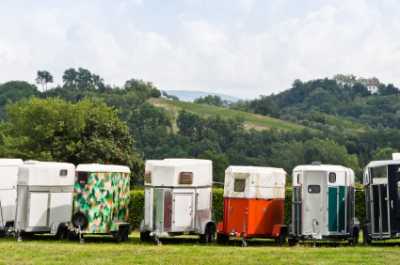|
By Jerry Tardif
When getting into the trailering of horses, many people don't know whether they should be shopping for the trailer first or the vehicle that will be used to tow it.
But there is a sound and logical manner in which to approach this problem.
Of course, if you already own a truck that can be used as the tow vehicle, that will set some limits on the size of the trailer you can buy.
If this is the case, it needs to already have a tow hitch, brake controller etc., or you need to include the cost of those items and their installation in your total budget estimate.
Also, you may find that the trailer you need cannot be towed with your existing truck.
In that case, you'll have to look at this adventure from the same standpoint as the buyer starting out with neither truck nor trailer.
Presuming that's where you're starting from, read on.

In general, you need to ask yourself questions related to why you're doing this and what problem you need to solve.
Look at in this way, your whole reason for getting into trailering is that you need to haul some horses.
So, let's start from that point.
Ask yourself these questions:
- How many horses do you need to be able to haul at one time?
- Can these horses be hauled with a standard size trailer?
Or are they draft horses requiring a large, extended trailer? And,
- How much can I afford to spend for both horse and trailer?
With these answers, you know where to start.
Begin by visiting trailer dealers.
There, find several trailers that meet your needs and determine their price.
Then, get the weight of these trailers you'd like to buy so you can add it with the weight of your horses and whatever else you'll need to bring with you when trailering.
With this information in hand, you can go truck shopping.
Notice I didn't say to buy one of the trailers — you can't do that yet because the truck and trailer form a system and you've got to get this right before buying either — the wrong decision would be expensive.
So, you start with the trailer because it's the first part of your solution,
You have a recurring need to haul a certain number of a certain size of horses within an affordable budget.
You may have to go back and forth several times before you've identified the truck and trailer combination that will both solve your hauling problem AND fall within your budget.
Ok.
You know what weight you need to be able to haul and you can subtract the cost of the trailer from your total budget amount leaving you with the amount of money you have left to spend on a truck.
If you don't have enough money left for a truck that will work with the trailer you want, consider buying one or both (trailer and truck) used instead of new.
If you still don't have enough money, then you know that you can't currently proceed as you would have liked.
Your only options are to scale back the truck and trailer or to put this purchase off until sometime in the future when you can afford to go forward.
If scaling back, determine whether or not you can make do with a smaller trailer?
For example, if you wanted to haul three or four horses at a time but can't afford to do so, can you get by with hauling only two at a time?
If so, you should now shop for a 2-horse trailer which will be cheaper.
And the truck to haul it will also be cheaper.
If you can't get by with hauling fewer horses at a time, or you discover that you can't even afford going with a 2-horse trailer, you'll likely have to put off this purchase until you can better afford to do so.
Important Notes:
1. While you may be tempted to consider a 1-horse trailer if it might work, that approach is rarely cost-effective.
A 1-horse trailer usually costs almost as much as a 2-horse trailer.
That's because even the 1-horse trailer will still require double axles, a break-away brake system, the same height trailer, etc.
Therefore, the cost of 1-horse trailers are generally close to that of 2-horse trailers.
2. If you want a tack/dressing room on the trailer and feel compelled to eliminate it to save money, you'll likely find that it won't make much of a difference when buying used.
It may provide a small savings if buying new, but it likely will not be a big savings.
Therefore, you'll probably be better off sticking with a trailer that has this feature, especially if buying used and you can find it.
Besides being an avid trail rider, Jerry Tardif is a technology consultant and a horse and nature photographer in SE Connecticut — see his work at: www.jerrytardif.com.
He is also co-founder and President of QueryHorse.
Back to Article Index
|